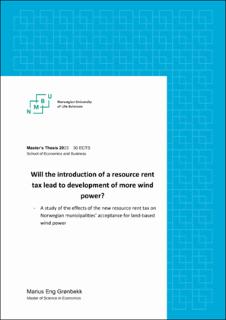| dc.description.abstract | The amount of energy produced by land-based wind power in Norway has increased
significantly the last couple of years. Despite this, estimates from NVE show that Norway could
have an energy deficit by 2027. Thus, the country is in need for more renewable energy.
However, the development of land-based wind power has met great resistance, especially in
relation with the publication of the National Framework for Land-Based Wind Power report
from NVE. Following massive complaints from municipalities and others, the report was
withdrawn in 2019, and the attitude among the municipalities have been negative since. Hence,
a resource rent tax has been proposed on the Norwegian land-based wind power sector, in order
to make land-based wind power more attractive among Norwegian municipalities.
The purpose of this thesis is to investigate if the proposed resource rent tax on land-based wind
power will change Norwegian municipalities’ acceptance for land-based wind power within
their municipality. The tax proposal states a resource rent tax with an effective tax rate of 40%,
and it is estimated to generate around NOK 2,5 billion in 2023, where 50% of the revenues is
going to the municipalities. The research question is answered mainly through a qualitative
method, consisting of semi-structured interviews with 17 Norwegian municipalities, both with
and without existing land-based wind power. The interviews both provided qualitative and
quantitative data that were analysed.
The results show that the current proposal for a resource rent tax has a slightly positive effect
for municipalities with a weak economy, and municipalities which put a lower value on their
local nature. However, the general findings are that the revenues from the resource rent tax are
regarded as too low to have an influence on the general acceptance towards land-based wind
power. Still, the results indicate that economic compensation in general is an important
argument for municipalities to be more positive towards land-based wind power.
My recommendation is that the authorities should look into alternatives to the proposed
resource rent tax scheme, especially at the allocation of the tax revenues among the
municipalities. The tax revenues should be distributed in such a way that the host municipalities
feel that they receive a compensation which corresponds to the negative effects that wind power
entails. By doing this, municipalities are inclined to be more positive towards future
development of land-based wind power in Norway. | |
